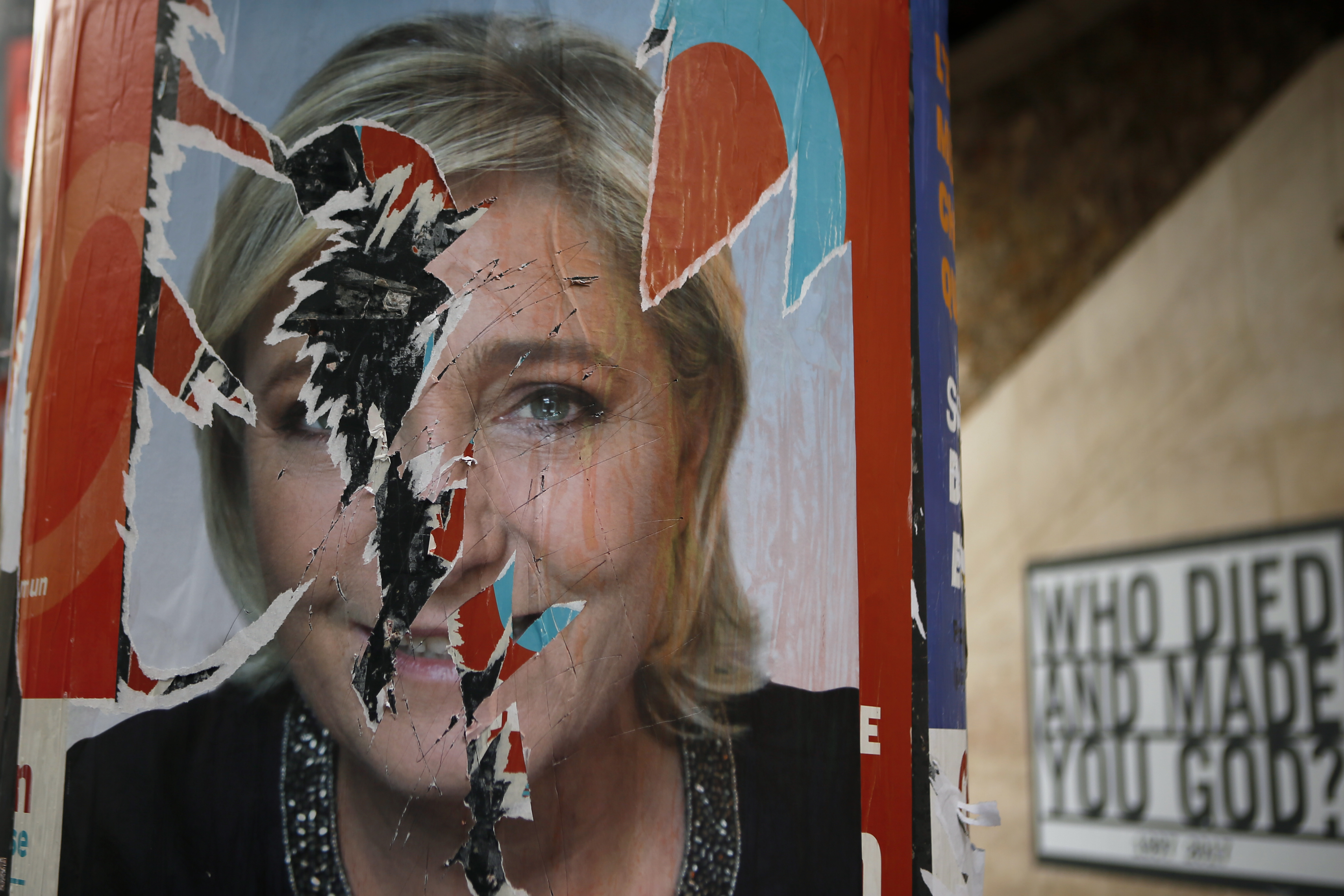Why France's nationalists should oppose the National Front
Don't let Marine Le Pen ruin nationalism


A free daily email with the biggest news stories of the day – and the best features from TheWeek.com
You are now subscribed
Your newsletter sign-up was successful
Ross Douthat and Noah Millman are right: Marine Le Pen stands for several policies that France should take seriously. But that's why nationalists on the French right should do everything in their power to make sure she loses in a landslide in the presidential run-off on May 7. For as long as Le Pen and the National Front are the faces of right-wing populism in France, controlling immigration and opposing the EU — both worthy goals — will be lost causes.
Douthat ignited controversy over the weekend with a column whose headline asked, "Is there a case for Le Pen?" (Here at The Week, Millman asked a similar question: "Why not Le Pen?") Yet the case Douthat made was arguably less for her — still less her party — than for a French right that's up to the task of confronting globalization. And Douthat was quite wrong about one thing, at least: the notion that Le Pen is ready to govern. For all her attempts to reform her image, as well the National Front's, she is still every inch a Le Pen, and the National Front is the ethnically chauvinist, basically anti-Dreyfusard party it always was.
True, National Front's immigration policy has softened over the years, beginning even before Marine Le Pen took over. The National Front no longer calls for the repatriation of legal immigrants, for example. But it's hard to believe Le Pen will be an effective force for encouraging Muslims to assimilate when there are still those in her party who don't think the Jews of France have ever been French enough.
The Week
Escape your echo chamber. Get the facts behind the news, plus analysis from multiple perspectives.

Sign up for The Week's Free Newsletters
From our morning news briefing to a weekly Good News Newsletter, get the best of The Week delivered directly to your inbox.
From our morning news briefing to a weekly Good News Newsletter, get the best of The Week delivered directly to your inbox.
Stepping down as the National Front's leader, temporarily, as she heads into the second round of the presidential election is not going to fool anyone into believing that Le Pen stands above party. It may, perhaps, ease ever so slightly the consciences of those on the right — or even anti-globalist left — who told themselves they'd never vote for the National Front. Yet the move is most significant for illustrating just how profoundly toxic and unelectable the National Front remains. Its name is poison to the populist causes it purports to champion. And so is Le Pen's, ultimately. With or without the party label, she's not headed to the Élysée Palace.
Yet the National Front has been growing, if not necessarily because of Marine's makeover. The roughly 20 percent of the vote that she won in the election's first round last week is the National Front's best ever performance, surpassing the earlier high-water mark she established in 2012 (when she won nearly 18 percent). The numbers are only an incremental improvement, however, over her father's results in the many presidential bids he mounted as the National Front's leader. He made it to the second round in 2002, after winning just shy of 17 percent in the first. In 1988 and 1995 he was near the 15 percent mark. Only in his final campaign, as 78-year-old in 2007, did his share collapse to just 10 percent.
The steady figures tell us something. They suggest the party commands a core of support that has remained constant for 30 years, a base now augmented, perhaps, by Marine's PR campaign, but more probably by the politics of the moment: This year's election is, after all, one in which neither of the major parties of the French left or right has made it into the second round. The National Front is a protest party, and in 2017, amid the wreckage of the Socialist François Hollande's presidency, voters are truly protesting. Still, most will not vote for Le Pen. Nor should they.
The narrow limits of the National Front's appeal were on display in 2002, when her father's second-round percentage wound up being just one point above his first-round performance. Marine is poised to do better this year — alas. If she gets as much as 40 percent of the vote, she could cripple the French right for a decade to come. At that level, the National Front would not be strong enough to displace the center-right party, the Republicans, but it might well keep the Republicans off-balance and out of power. Already, center-right candidates are politically flanked when they try to take on immigration or the EU: a wary press assails them from the center and left, accusing them of aping Le Pen, while the National Front makes a more visceral, outsider appeal to irate populists. With the right in fragments like this, the left marches forward. And should Emmanuel Macron's centrist formula fail, a radical figure like Jean-Luc Mélenchon or a leader from the left of the Socialist Party will be well placed to win next time.
A free daily email with the biggest news stories of the day – and the best features from TheWeek.com
This is no accident: It was a Socialist president who made the National Front a force in French politics in the first place. In the early 1980s, François Mitterrand instructed state broadcasters to give the National Front, hitherto a negligible party, greater attention — supposedly for the sake of fair play. This led directly to Jean-Marie Le Pen's first double-digit performance, in the 1988 election — in which Mitterand was easily re-elected. The Mitterrand strategy, if that's what it was, of dividing and radicalizing the right might be helpful to the left, but it entails terrible costs for France. Even without getting to power, the National Front only intensifies the conflicts of French politics, stoking and feeding off anger without having to take on the responsibility of governing.
France is not the only country to find itself in this predicament. Much of the Western world finds that the parties of austerity and free-market economics no longer deliver the growth that used to reconcile the public to tougher competition and fewer services. The populist nationalist right rushes to fill the void left by the traditional conservatives' downfall. But the nationalists have little experience in government and, in Europe especially, come programmed with genetic memory of 19th and 20th century authoritarianism (or worse). The Le Pen clan and their National Front are telling examples.
Yet France provides a counterexample as well, in the historical person of Charles de Gaulle, a nationalist whose nationalism did not reduce to bigotry. He even had what might be a viable solution today — as it was not in his time — for the problem of the European Union: a federal alternative, composed of strong, sovereign nations. His nationalism was economic, pragmatic, and republican, in contrast to the racial and sectarian nationalism that has so often bloodied Europe.
That is the sort of nationalism that French nationalists should promote — not the vile brand long propagated by the National Front.
From de Gaulle to Le Pen is a long way down. And for Gaullism to live again, the National Front must die. Just think of it as a vote against Mitterrand.
Daniel McCarthy is director of the Novak Journalism Fellowship Program at the Fund for American Studies, the editor of Modern Age, and a columnist at The Spectator. His freelance journalism has appeared in a variety of publications in the U.S. and internationally, including the New York Times, the Daily Telegraph, The National Interest, and Reason.
